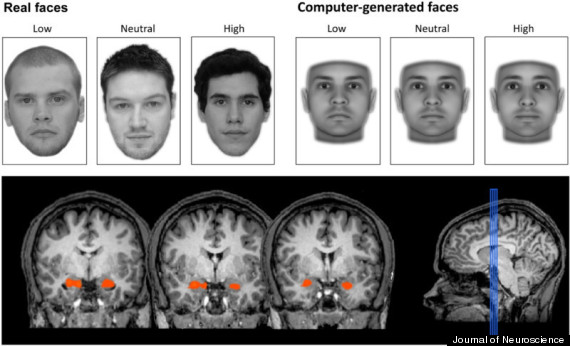How do we know when to trust strangers? New research suggests we make that determination almost instantly -- simply by sizing up their faces.
Previous research revealed which facial features tend to be perceived as trustworthy -- such as a U-shaped mouth and big baby-like eyes. But the new study pinpoints exactly when the brain renders its judgment about trustworthiness.
"Our findings suggest that the brain automatically responds to a face's trustworthiness before it is even consciously perceived," Dr. Jonathan Freeman, an assistant professor of psychology at New York University and the study's senior author, said in a written statement. "The results are consistent with an extensive body of research suggesting that we form spontaneous judgments of other people that can be largely outside awareness."
For their study, Freeman and his colleagues focused on the amygdala, a brain region known to play a key role in decision-making and emotional behavior. As the experimental subjects viewed images of real and computer-generated faces, their brains were scanned to show activity in the amygdala.
 The researchers quickly showed the study’s subjects images of real faces as well as artificially generated faces whose trustworthiness cues could be manipulated (as shown above) while examining the subjects’ neurological responses.
The researchers quickly showed the study’s subjects images of real faces as well as artificially generated faces whose trustworthiness cues could be manipulated (as shown above) while examining the subjects’ neurological responses.
To ensure that the subjects would not consciously view the faces, the researchers flashed the images across the screen for only a few milliseconds. All of the images used were also graded for how trustworthy they appeared to be by others.
What did the researchers find? Regions inside the subjects' amygdalas reacted to the images, tracking both how untrustworthy a face appeared and the degree to which the face was recognized as trustworthy or not -- even though the image flashed so quickly people couldn't consciously make sense of it or had no idea they even saw it.
"The findings are surprising because they show that face evaluation can be done without perceptual awareness," Freeman told The Guardian. "The social cues for trustworthiness are considerably more subtle and complex than a simple, fearful expression on a clearly emotional face. It suggests that the amygdala's processing of social cues outside awareness may be more extensive than we thought."
This new study was published in the Journal of Neuroscience on Wednesday.
